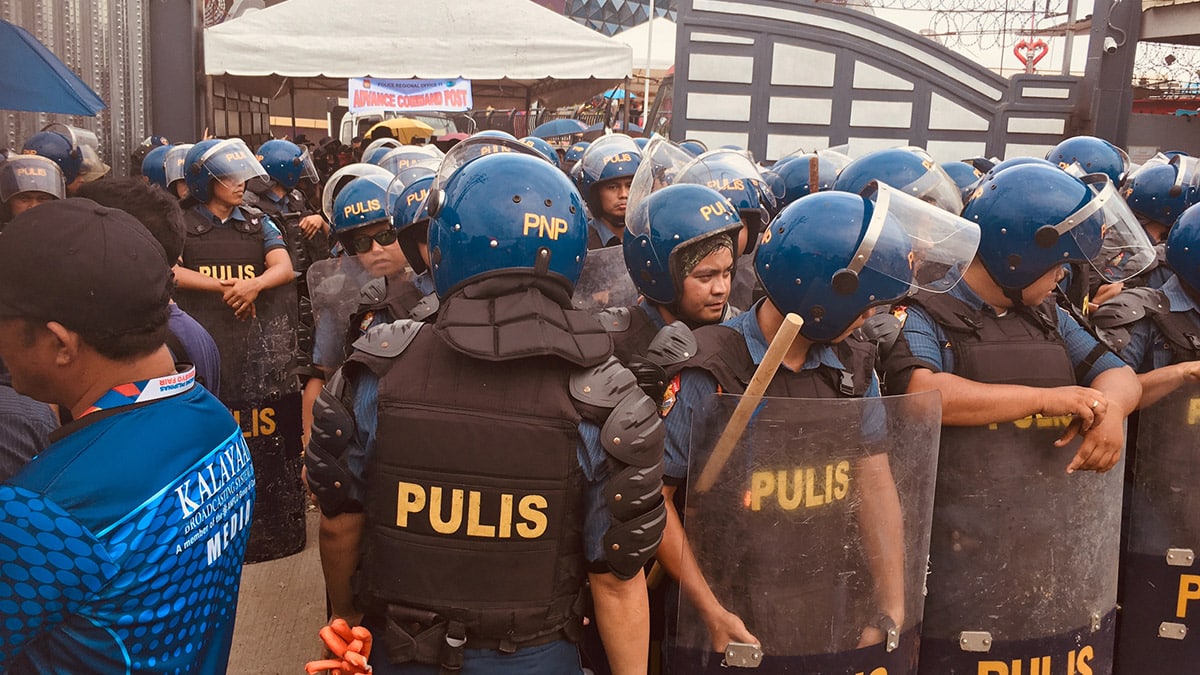IBP-Davao: Respect for rule of law in ongoing search for Quiboloy

FIFTH TRY Some of the 2,000 police officers mobilized on Saturday to again serve an arrest warrant on televangelist Apollo Quiboloy, assembled outside the KOJC compound in Davao City. —Photos by Germelina Lacorte
MANILA, Philippines — Police have the right to enter or even break into a place where a wanted person is believed to be hiding, but they “do not have the authority to occupy the premises” of the area after searching it, according to the Integrated Bar of the Philippines (IBP)-Davao City Chapter, pertaining to the August 24 raid at the Kingdom of Jesus Christ (KJC) compound in Buhangin District.
IBP pointed this out as it likewise called for “respect for the rule of law and sobriety in its application,” especially to law enforcement officers conducting arrest warrants, their subjects, and the people affected by the implementation.
READ: Quiboloy still inside KJC compound – Davao PNP
To be clear, law enforcers, such as the elements of the Philippine National Police (PNP), have the authority and duty to obey the orders of our courts. This includes the implementation of warrants issued by courts for the arrest of persons who are under a criminal indictment in court.
But the IBP explained that there are limits imposed by the law.
“If the police have good basis to believe that a person to be arrested is inside a certain place, they have the right to enter the place and even to break into such place if refused admittance after announcing their authority and intention,” it said.
“However, after conducting a search for the person, or persons, to be arrested within a reasonable period of time, the police do not have the authority to occupy the premises or exclude any lawful occupant thereof from free entry and egress therefrom,” it added.
“Likewise, the use of violent force, is allowed only when the police officers are, themselves, exposed to the danger of bodily harm in the exercise of their functions. In any case, the degree of the force must always be proportionate to the amount of danger,” IBP furthered.
Duty-bound by law
Meanwhile, it also reminded individuals inside the compound that they are also “duty-bound by law to allow the police to exercise their authority.”
“Attempts to stop, or hinder, the lawful exercise by the police of their mandate to implement a warrant of arrest may result in criminal liability for obstruction of justice or worse if any act of violence is committed,” the IBP said.
“Nonetheless, any accused in any criminal case may avail of any, and all, of the available legal remedies to protect his or her interest and enforce his or her rights. All of this is part of due process under the law,” it added.
On Saturday around 2,000 members of the Philippine National Police (PNP) raided the KJC compound in Buhangin District, Davao City to serve arrest warrants for Quiboloy, who is wanted for child abuse, sexual abuse, and qualified trafficking cases.
Last April 3, a Davao Regional Trial Court ordered the arrest of Quiboloy and his five subordinates. They are facing charges of violating the Anti-Child Abuse Law, specifically the provision on sexual abuse of minors and maltreatment.
Days later on April 11, a Pasig City court also issued a warrant for the arrest of the self-proclaimed “appointed son of God” for qualified human trafficking, a nonbailable offense.
Quiboloy has been evading arrest since while authorities are continuously searching for his whereabouts.
Davao police said that Quiboloy is still inside the KJC compound, revealing the discovery of an “underground area” where the religious leader could be hiding.
Following the recent raid, police said they are “more than confident now,” that the fugitive is inside the compound, adding that they are still looking for the entrance of the “underground area.”
Authorities first raided the KJC compound last June 10, but members of the religious sect prevented them from entering.